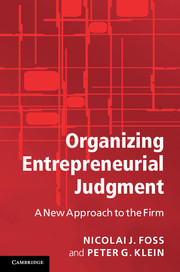Book contents
- Frontmatter
- Contents
- Figures
- Preface
- 1 The need for an entrepreneurial theory of the firm
- 2 What is entrepreneurship?
- 3 Entrepreneurship: from opportunity discovery to judgment
- 4 What is judgment?
- 5 From shmoo to heterogeneous capital
- 6 Entrepreneurship and the economic theory of the firm
- 7 Entrepreneurship and the nature and boundaries of the firm
- 8 Internal organization: original and derived judgment
- 9 Concluding discussion
- References
- Index
- References
3 - Entrepreneurship: from opportunity discovery to judgment
Published online by Cambridge University Press: 05 June 2012
- Frontmatter
- Contents
- Figures
- Preface
- 1 The need for an entrepreneurial theory of the firm
- 2 What is entrepreneurship?
- 3 Entrepreneurship: from opportunity discovery to judgment
- 4 What is judgment?
- 5 From shmoo to heterogeneous capital
- 6 Entrepreneurship and the economic theory of the firm
- 7 Entrepreneurship and the nature and boundaries of the firm
- 8 Internal organization: original and derived judgment
- 9 Concluding discussion
- References
- Index
- References
Summary
In this chapter we discuss and confront two of the conceptions of entrepreneurship that were discussed in the preceding chapter, namely Israel Kirzner’s concept of entrepreneurship as alertness to profit opportunities and the concept of entrepreneurship as judgment associated with Cantillon, Say, Knight, and Mises. As both concepts have a pedigree in Austrian economics, we also discuss some of the key tenets of the Austrian approach.
Kirzner’s notion of alertness to previously undiscovered profit opportunities is a dominant strand of the contemporary entrepreneurship literature, along with Schumpeter’s notion of entrepreneurship as innovation and Knight’s idea of entrepreneurship as judgment. The distinction between “Schumpeterian” and “Kirznerian” entrepreneurs has become standard in the literature (although Kirzner [2009] himself contests the distinction). Among Austrian economists, Kirzner’s understanding of the market as “an entrepreneurially driven process” (Kirzner, 1997: 67) of “mutual discovery” (Kirzner, 1997: 71) is one of the leading perspectives on production, exchange, and market efficiency.
- Type
- Chapter
- Information
- Organizing Entrepreneurial JudgmentA New Approach to the Firm, pp. 43 - 77Publisher: Cambridge University PressPrint publication year: 2012

